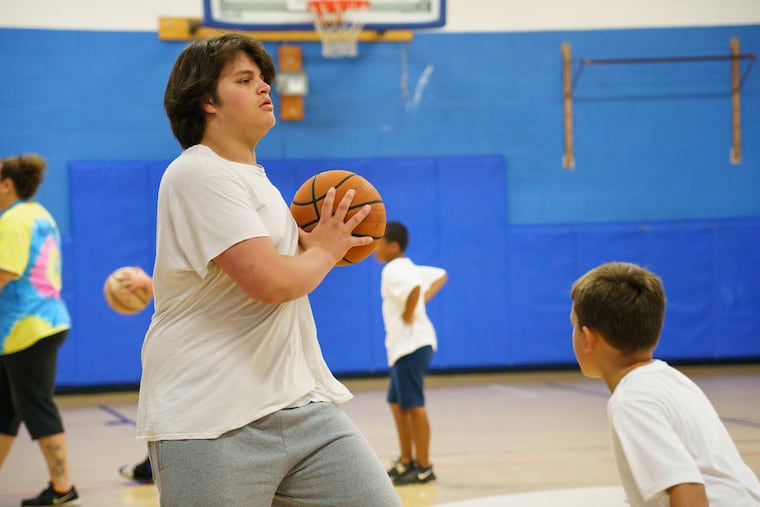City program makes camp a possibility for youth with behavioral health challenges
Often times, the grant is a game-changer for families that otherwise would struggle to find a camp to accommodate their child's needs. Before 1998, “there really was not a place for children to go to camp who had a behavioral health diagnosis,” said program leader Carol Chase.

Before 2016, Miguel Batiz spent countless summer days in his Holmesburg bedroom, using the computer, playing video games, and eating. Aside from trips with his mother and two younger siblings to ride bikes or visit nearby parks, he stayed home, nearly isolated.
When the school year neared its end in 2016, his mother, Dorothy Miller, worried that Batiz, who struggles to socialize and doesn’t like sports, would spend another summer in the house. Batiz was diagnosed with attention deficit hyperactivity disorder (ADHD) as a child, and later diagnosed in 2018 with “high-functioning” autism.
Miller shared her concerns with one of Batiz’s therapists, and mentioned that she could not afford camp. Immediately, the therapist mentioned a grant offered through the city’s Department of Behavioral Health that provides money for children with behavioral health challenges to attend camp.
In the years since, Batiz, now 15, has flourished at the Northeast Family YMCA’s day camp on Knights Road. And it’s all thanks to the Madeline Moore summer camp grant, Miller said.
Without it, camp wouldn’t have been a possibility.
“I just feel like if we would have never got the grant,” she said, “he would have never had that opportunity ... to do all those things and meet all those different people.”
Like Batiz and Miller, swarms of children with behavioral health disabilities and their parents struggle to find summer camps or miss out completely each year because it can be challenging to find one that makes the child comfortable and accommodates special or specific needs.
But the grants of up to $400, provided on a first-come, first-serve basis, can be game-changing. Funding gives families choices, the chance to choose a camp they think will be best for their children.
Since 1997, when the program began with limited funds, millions of dollars have been doled out to thousands of local families to make camp accessible for local youth, ages 6 to 17, with a behavioral health diagnosis or disability. Families submit grant applications through providers for their children.
The department spent nearly $4 million since 2013 to send more than 9,400 children to camps of all kinds. In 2018, the program spent $499,220 on 1,335 campers — an average of about $374 per family.
Department Commissioner David T. Jones said the program supports between 1,300 and 1,400 Philadelphians each year and “gives [youth] an opportunity to build relationships that promote greater social connectedness, and mitigate against feelings of isolation and loneliness.”
It allows the children to be included “with their typically developing peers,” which promotes skills that result in opportunities down the road, Jones said.
Batiz wrapped up his four weeks of summer camp on July 12. While at camp, he made new friends, visited new places, and played sports.
Expectations about children with behavioral health diagnoses can be a barrier to camp, says Carol Chase, who directs the program and manages partnerships with about 120 camps citywide. The program partners include local recreation centers, Boys and Girls Clubs, and YMCAs.
“There is this stigma about children who have a behavioral health diagnosis, maybe what their behaviors will be when they go to camp," said Chase, who has been with the program for eight years. "We are partnering with camps that are saying send your children to us, and we will take care of them … without any reservations.”
Before 1998, “there really was not a place for children to go to camp who had a behavioral health diagnosis,” she said.
Parents worry about whether their children will feel safe and comfortable at camp, and whether they will be bullied. The grant kills two birds with one stone: removing the affordability barrier, and connecting families with camps welcoming to children with certain diagnoses.
Stigma is an ongoing issue, Chase said, but one they see less frequently since the grant has been created.
With the grant, “this child is integrated with other children and participating in all the summer activities without any type of stigma,” Chase said.
Miller said camp “brought him out of his shell and helped him to open up.”
There, he bowled, rock climbed, and zip lined. Beyond that, the camp offered structure that Miller said Batiz needed.
“The grant was the best thing that’s ever happened for this family,” Miller said. “I don’t regret doing the paperwork and sending him.”